2013版初中英语全程复习方略课件(教材复习案)七年级下册 Units 5、6(译林牛津版)
文档属性
| 名称 | 2013版初中英语全程复习方略课件(教材复习案)七年级下册 Units 5、6(译林牛津版) | 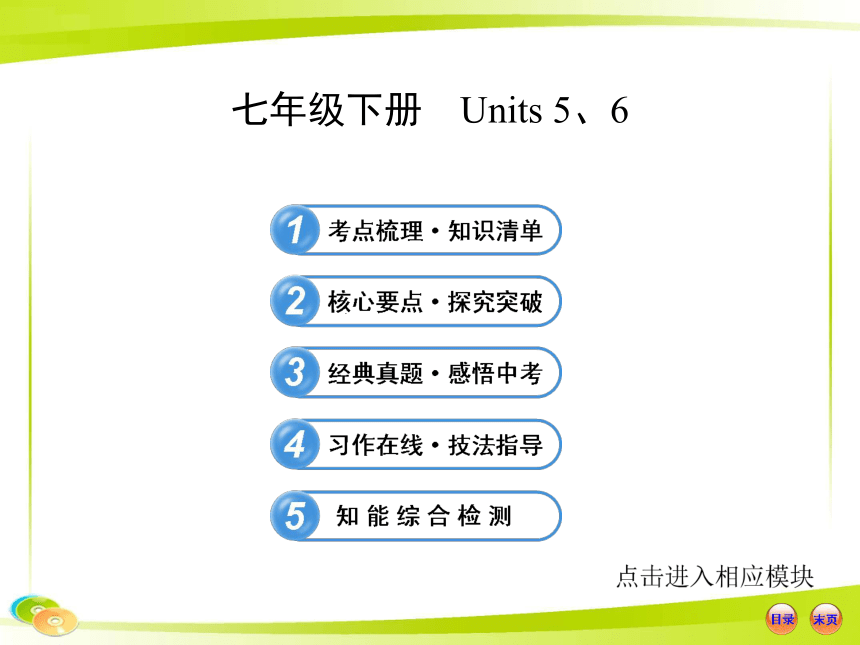 | |
| 格式 | zip | ||
| 文件大小 | 1.2MB | ||
| 资源类型 | 教案 | ||
| 版本资源 | 牛津译林版 | ||
| 科目 | 英语 | ||
| 更新时间 | 2014-02-26 21:35:06 | ||
图片预览

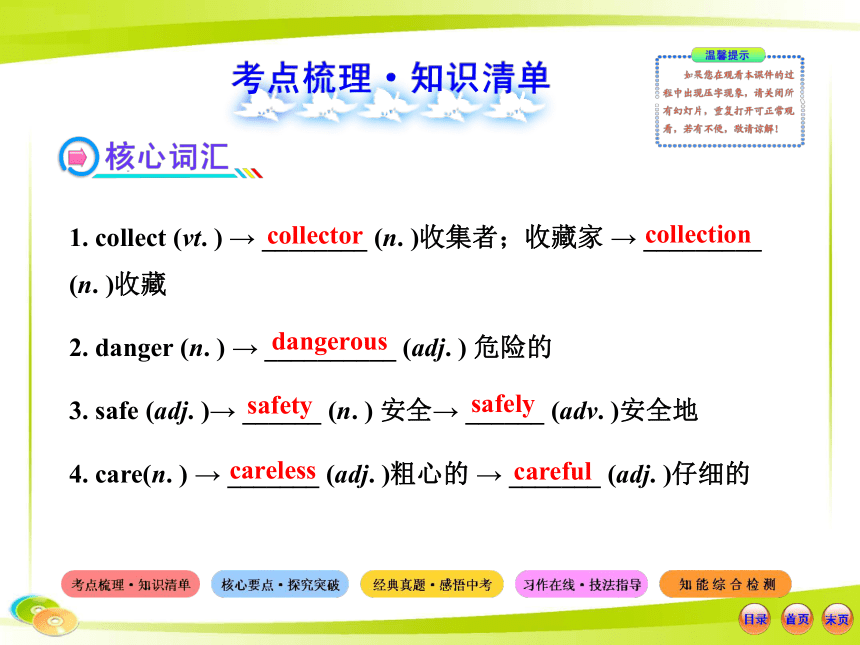
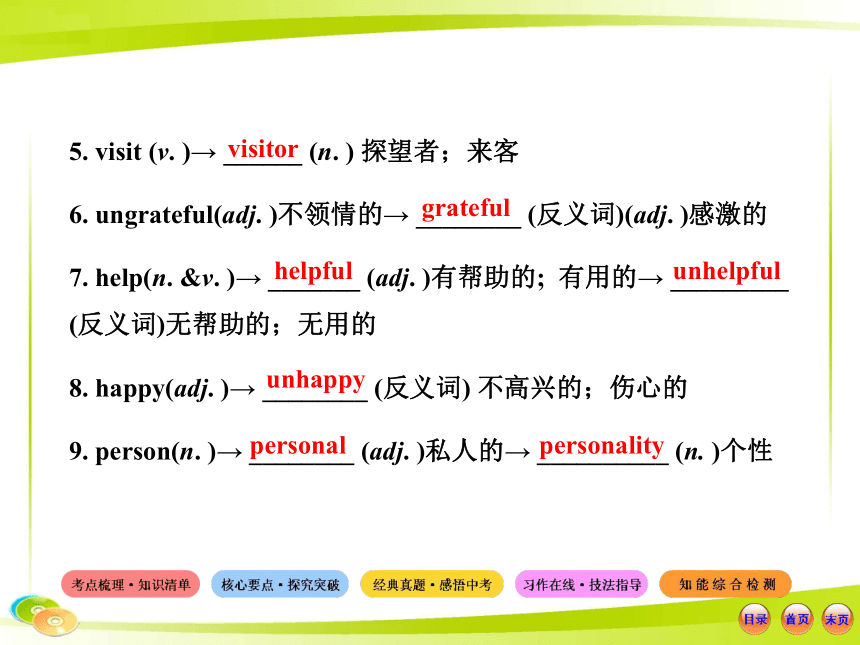
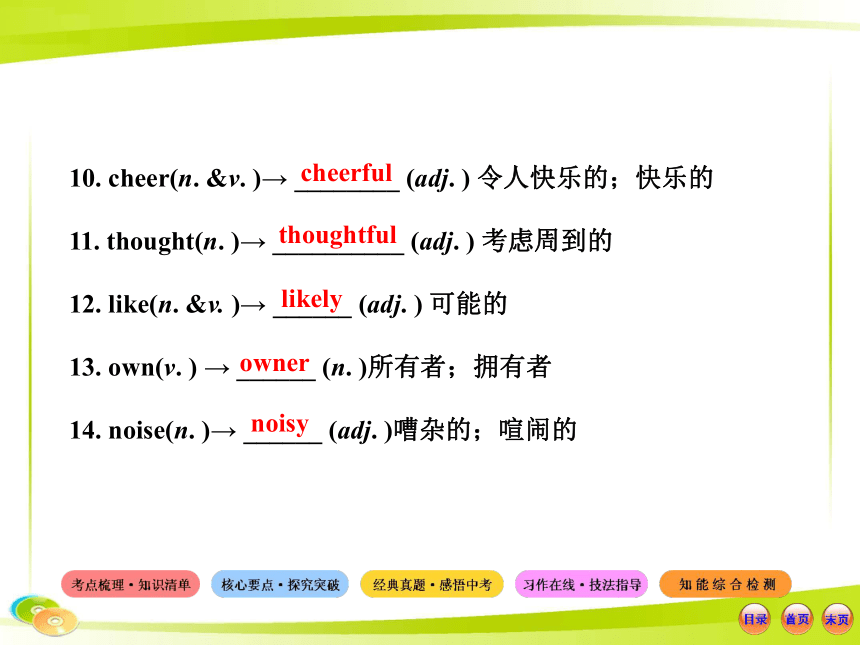
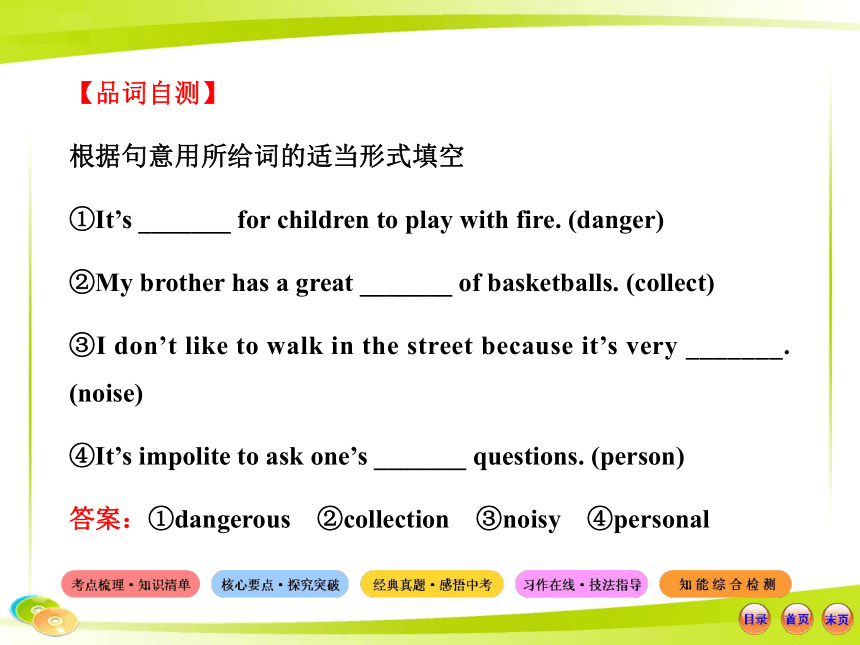
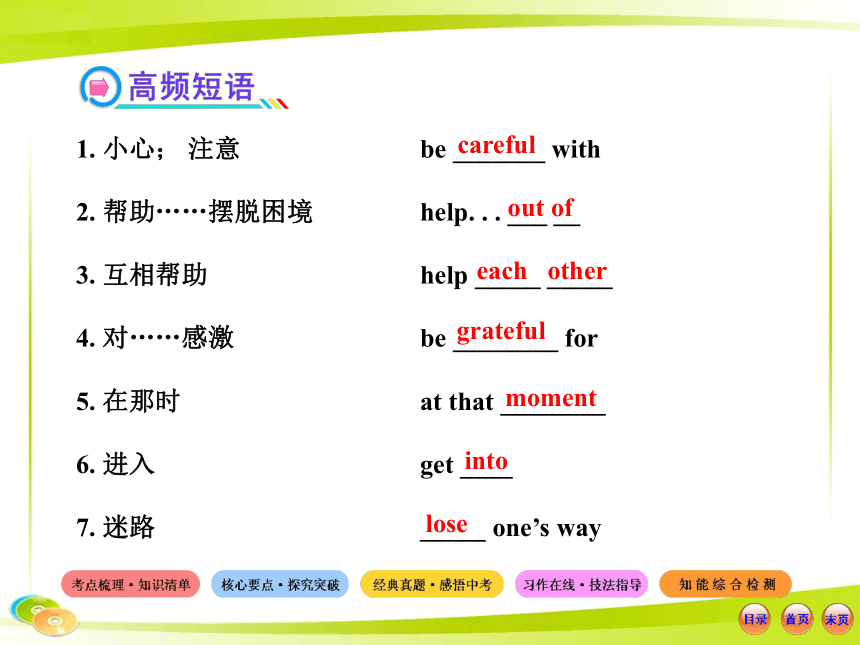
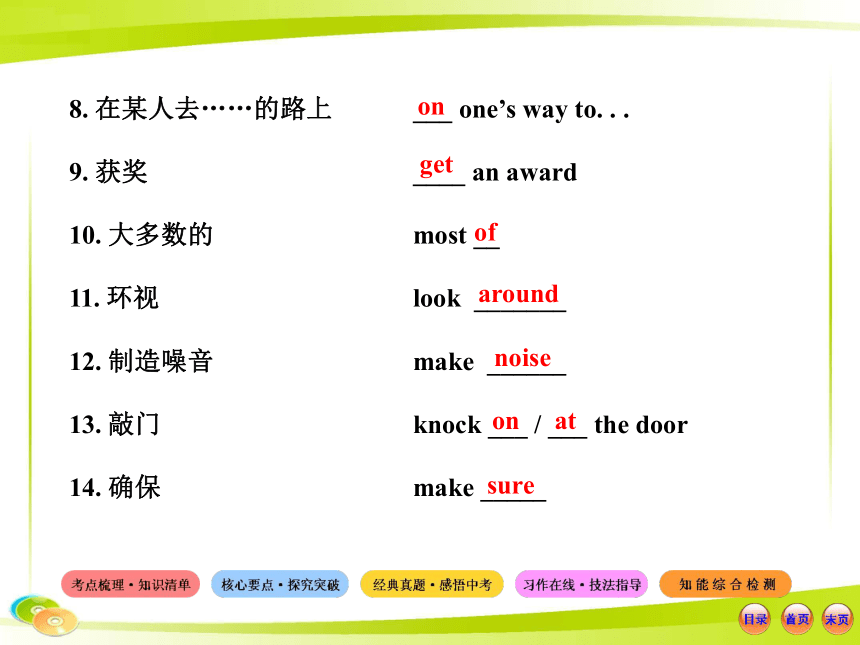
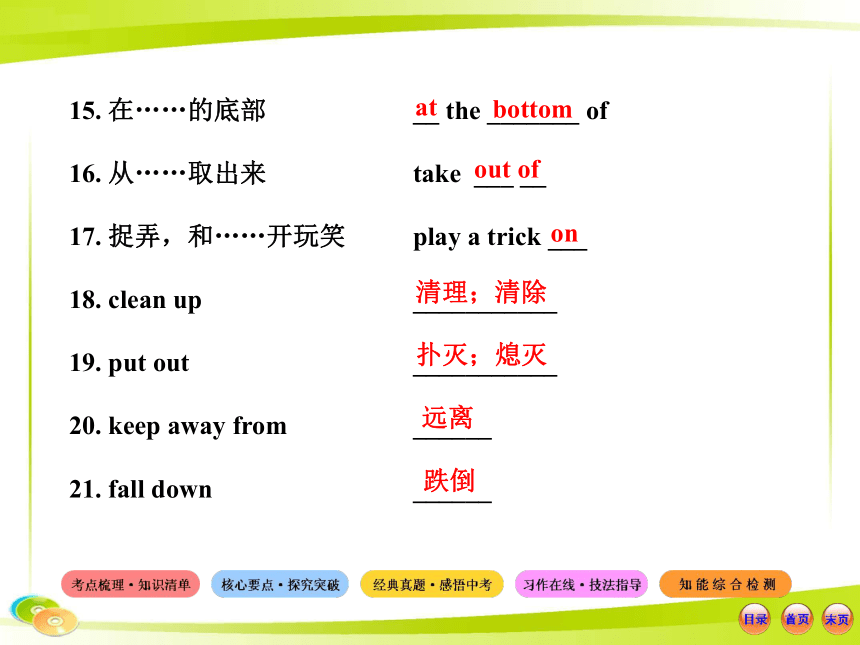
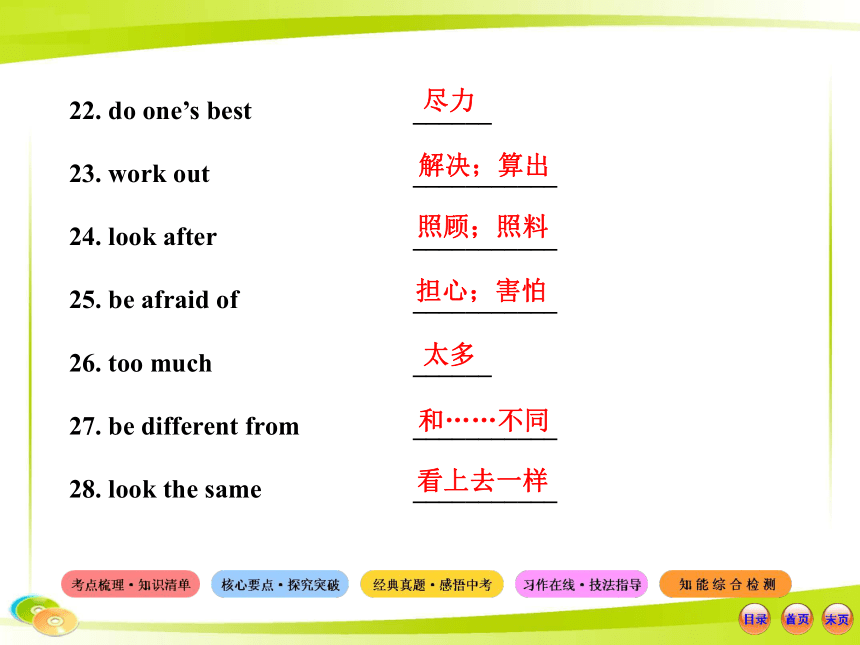
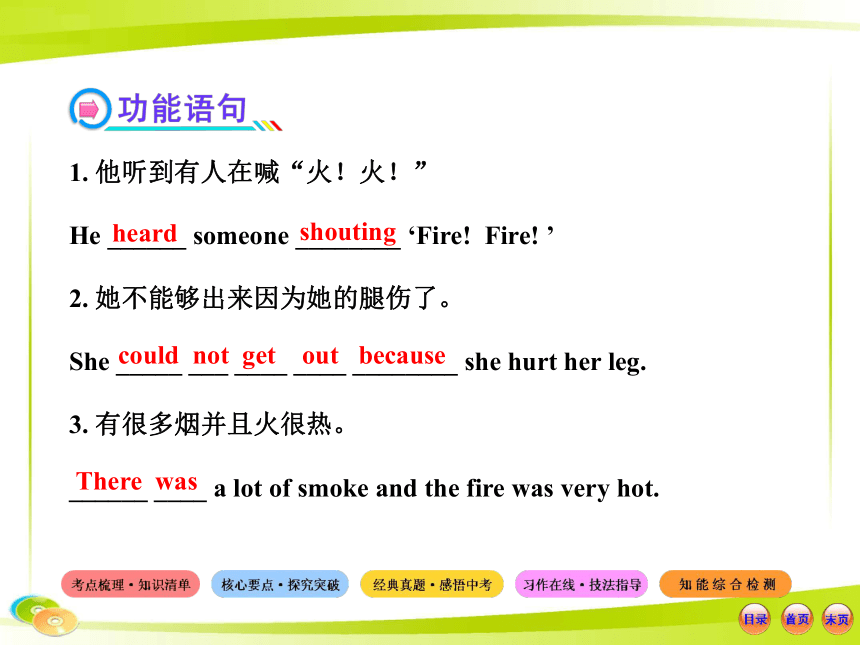
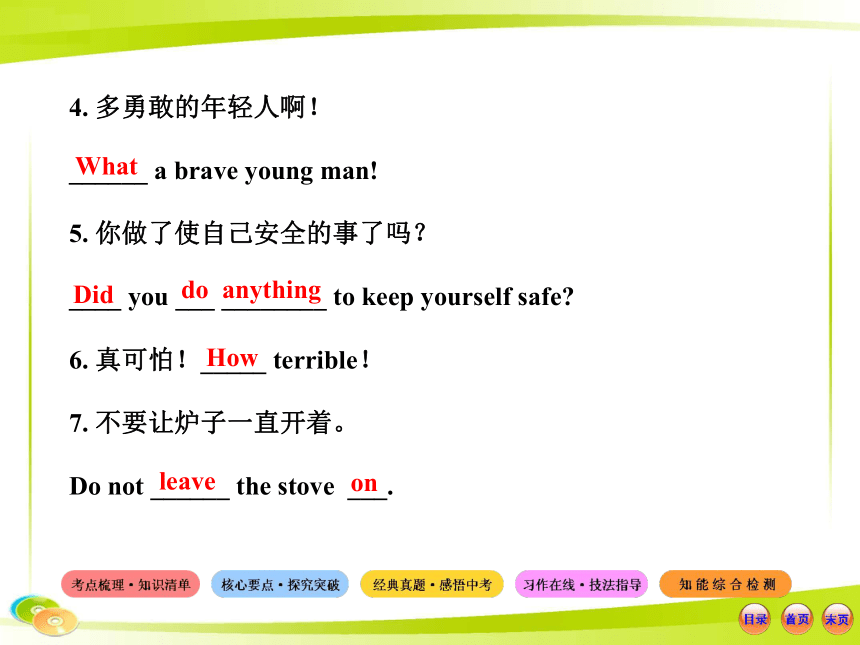
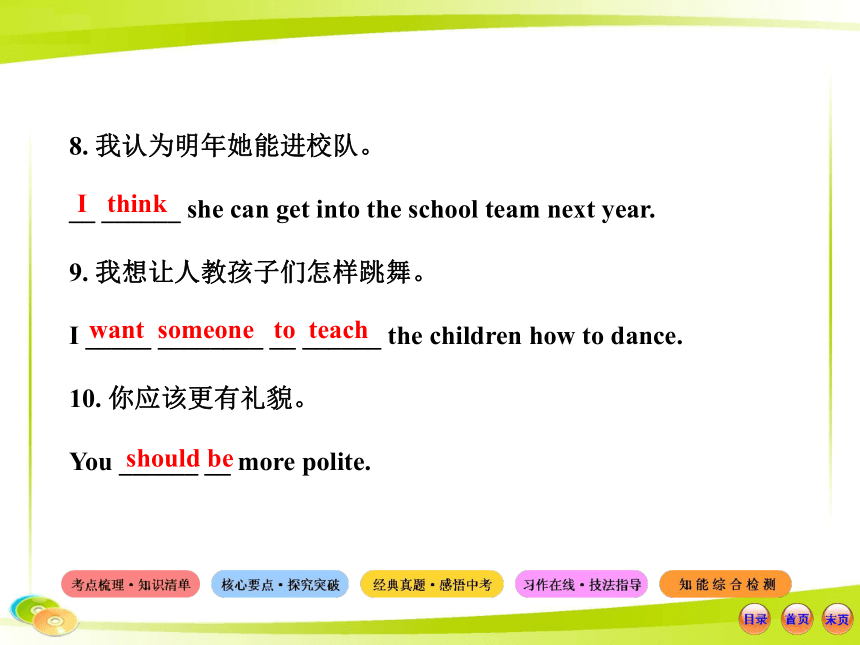
文档简介
课件63张PPT。七年级下册 Units 5、61. collect (vt. ) → ________ (n. )收集者;收藏家 → _________ (n. )收藏
2. danger (n. ) → __________ (adj. ) 危险的
3. safe (adj. )→ ______ (n. ) 安全→ ______ (adv. )安全地
4. care(n. ) → _______ (adj. )粗心的 → _______ (adj. )仔细的collectorcollectiondangeroussafetysafelycarelesscareful5. visit (v. )→ ______ (n. ) 探望者;来客
6. ungrateful(adj. )不领情的→ ________ (反义词)(adj. )感激的
7. help(n. &v. )→ _______ (adj. )有帮助的; 有用的→ _________ (反义词)无帮助的;无用的
8. happy(adj. )→ ________ (反义词) 不高兴的;伤心的
9. person(n. )→ ________ (adj. )私人的→ __________ (n. )个性visitorgratefulhelpfulunhelpfulunhappypersonalpersonality10. cheer(n. &v. )→ ________ (adj. ) 令人快乐的;快乐的
11. thought(n. )→ __________ (adj. ) 考虑周到的
12. like(n. &v. )→ ______ (adj. ) 可能的
13. own(v. ) → ______ (n. )所有者;拥有者
14. noise(n. )→ ______ (adj. )嘈杂的;喧闹的cheerfulthoughtfullikelyownernoisy【品词自测】
根据句意用所给词的适当形式填空
①It’s _______ for children to play with fire. (danger)
②My brother has a great _______ of basketballs. (collect)
③I don’t like to walk in the street because it’s very _______. (noise)
④It’s impolite to ask one’s _______ questions. (person)
答案:①dangerous ②collection ③noisy ④personal1. 小心; 注意 be _______ with
2. 帮助……摆脱困境 help. . . ___ __
3. 互相帮助 help _____ _____
4. 对……感激 be ________ for
5. 在那时 at that ________
6. 进入 get ____
7. 迷路 _____ one’s way carefulout ofeach othergratefulmomentintolose8. 在某人去……的路上 ___ one’s way to. . .
9. 获奖 ____ an award
10. 大多数的 most __
11. 环视 look _______
12. 制造噪音 make ______
13. 敲门 knock ___ / ___ the door
14. 确保 make _____ongetofaroundnoiseonatsure15. 在……的底部 __ the _______ of
16. 从……取出来 take ___ __
17. 捉弄,和……开玩笑 play a trick ___
18. clean up ___________
19. put out ___________
20. keep away from ______
21. fall down ______atbottomout ofon清理;清除扑灭;熄灭远离跌倒22. do one’s best ______
23. work out ___________
24. look after ___________
25. be afraid of ___________
26. too much ______
27. be different from ___________
28. look the same ___________尽力解决;算出照顾;照料担心;害怕太多和……不同看上去一样1. 他听到有人在喊“火!火!”
He ______ someone ________ ‘Fire! Fire! ’
2. 她不能够出来因为她的腿伤了。
She _____ ___ ____ ____ ________ she hurt her leg.
3. 有很多烟并且火很热。
______ ____ a lot of smoke and the fire was very hot. heardshoutingcould not get out becauseThere was4. 多勇敢的年轻人啊!
______ a brave young man!
5. 你做了使自己安全的事了吗?
____ you ___ ________ to keep yourself safe?
6. 真可怕!_____ terrible!
7. 不要让炉子一直开着。
Do not ______ the stove ___. WhatDiddo anythingHowleaveon8. 我认为明年她能进校队。
__ ______ she can get into the school team next year.
9. 我想让人教孩子们怎样跳舞。
I _____ ________ __ ______ the children how to dance.
10. 你应该更有礼貌。
You ______ __ more polite. I thinkwant someone to teachshould be11. 我喜欢金鱼,因为我喜欢看着它游来游去。
I like my goldfish because I like _________ it _____ around.
12. 不要给它们太多的食物,这很重要。
It is very important ____ __ _____ them too much food.
13. 扇尾金鱼很好养。
Fantail goldfish ____ ____ __ ____ after. watchingswimnot to giveare easy to look1. 情态动词can, could, must和should的用法
【见P134】
2. 感叹句 【见P148】
3. 祈使句 【见P148】1. alone adv. & adj. 独自;单独
◆On 10th May, Zhang Hua was at home alone.
5月10号张华独自一人在家。①The old man lives ________ all his life, but he never feels ________ because all the villagers look after him well.
A.alone; lonely B. alone; alone
C. lonely; alone D. lonely; lonely
② He doesn’t want to go there alone. (改为同义句)
He doesn’t want to go there _______ _______. 【自主归纳】alone/lonely的用法辨析【一言巧辨异】 His father lives alone in the lonely village, so he often feels lonely. 他的父亲独自一人住在那个偏僻的山村里,所以他常常感到寂寞。
答案:①A ②by himself2. trouble n. 麻烦 vt. 打扰,使烦恼
◆She isn’t any trouble. 她不是麻烦。
①—Let’s help the person ________ trouble.
—OK. Let’s go.
A. at B. with C. in D. for②They have trouble ________ (understand) what she said.
③—What is the trouble with Mary?
— ________
A. She is a student. B. She is reading.
C. She has a bad cold. D. She is outgoing. 【自主归纳】trouble的用法
(1)作名词,意为“麻烦”,常用搭配为
①in trouble处于困境中
②get into trouble陷入困境
③have (some) trouble (in) ______ sth. 做某事有困难
④What’s the trouble with you? =What’s your trouble?
你怎么了?doing(2)trouble作动词,意为“打扰;使烦恼”,常用搭配为
①trouble sb. to do sth. 麻烦某人做某事
②be sorry to trouble sb. 很抱歉打扰某人
答案:①C ②understanding ③C3. anywhere adv. 任何地方
◆Cats sleep anywhere. . . 猫可以在任何地方睡觉……
①—I can’t find my purse _______.
—Don’t worry. You must put it _______.
A. somewhere; anywhere B. anywhere; somewhere
C. somewhere; somewhere D. anywhere; anywhere
②This summer he wants to go _______ for his vacation.
A. anywhere exciting B. somewhere exciting
C. exciting anywhere D. exciting somewhere【自主归纳】somewhere/anywhere/everywhere/nowhere的用法辨析
(1) ___________ “某个地方”,常用于肯定句中;
(2) _________代替somewhere用于一般疑问句及否定句中;用于肯定句中时,指“任何地方”,有时也可以和everywhere换用;
(3) __________“任何地方”,相当于here and there;
(4) _________“没有地方”,表示否定。
答案:①B ②Bsomewhereanywhereeverywherenowhere4. on one’s way to. . . 在某人去……的路上
◆Daniel was on his way to the club.
丹尼尔在去俱乐部的路上。
①我在去电影院的路上遇见了我的老朋友。
I met my old friend ______ ______ ______ ______ the cinema. ②— _______, what’s your QQ number?
—Oh, it’s 357946.
A. On the way B. By the way
C. In a way D. In the way
③Playing too much computer games can get _______ of your study.
A. in the way B. on the way
C. in a way D. by the way【自主归纳】常见由way构成的短语
(1) ___ one’s/the way to 在某人去……的路上
(2) ___ the way 顺便问一下;附带说说
(3)in the way 挡道;妨碍
(4)in a way 在某种意义上
(5)in this/that way 以这/那种方式
(6)in many/different ways 以很多/不同的方式
答案:①on the /my way to ②B ③Aonby5. put out扑灭;熄灭
◆He put out the fire with a blanket and helped Mrs Sun out.
他用毯子扑灭了火,帮助孙太太逃了出来。
①It took the fireman three hours to _______ the big fire.
A. put on B. put up C. put out D. put off
②We can’t _______ the plan, though we have many difficulties.
A. put up B. put off C. put out D. put away
③Don’t _______ the picture on the wall. It’s too ugly.
A. put up B. put off C. put out D. put on答案:①C ②B ③A【自主归纳】6. Do not leave the stove on. 不要让炉子一直开着。
① _______ (not stand) there. It’s dangerous.
②Don’t take the books away, _______ _______ ?(完成反意疑问句)③—Tom, don’t play football here.
— _______.
A. It doesn’t matter
B. I don’t do that
C. Sorry, I won’t do that again
D. Never mind【自主归纳】
(1)“Don’t +动词原形”构成否定的祈使句,意为“不要……; 禁止……”,反意疑问句用 “ ____ ____”。
(2)“Don’t +动词原形”句式可与No + v. -ing/n. 句式或You mustn’t/shouldn’t do sth. 句式转换。
(3)“Don’t +动词原形”句式表示批评性建议时,答语常用Sorry, I won’t . . . 或类似句式。
答案:①Don’t stand ②will you ③Cwill you7. I like my goldfish because I like watching it swim around.
我喜欢金鱼,因为我喜欢看着它游来游去。
①The policemen asked him whether he had watched a black car _______ by.
A. going B. goes C. go D. went
②A thief was seen _______ (steal) a wallet from a young woman.
③I heard the couple _______ (quarrel) with each other at that moment when I walked by their house. 【自主归纳】
(1)watch sb. /sth. ___ sth. 看见某人/某物干了某事(所跟的动词原形强调动作的全过程)。
其被动形式为:sb. /sth. be watched _____ sth.
(2) watch sb. /sth. ______ sth. 看见某人/某物正在干某事(所跟的动词-ing形式强调动作正在进行)。doto dodoing(3)有类似用法的动词
①see/hear/notice sb. /sth. do sth. 看见/听见/注意到某人/某物干了某事。
其被动形式为:sb. /sth. be seen/heard/noticed to do sth.
②see/hear/notice sb. /sth. doing sth. 看见/听见/注意到某人/某物正在干某事
答案:①C ②to steal ③quarrellingⅠ. 词汇运用
1. (2011·盐城中考)We all know that Millie has a _______ (宠物)dog named Eddie.
2. (2011·南通中考) If you live in a new city without friends,you can be very _______ (unhappy because of being alone).
3. (2011·宿迁中考)Now we are short of water and we should
s _______ water in our daily life.
答案:1. pet 2. lonely 3. save 4. (2011·南通中考)The bottle was full yesterday but now it’s _______. Perhaps Tom has drunk all the juice in it.
5. (2011·雅安中考)Tom has the _______ (能力) to do the work.
6. (2011·宁波中考) Sorry, I can’t follow you. Would you please speak more _______ (缓慢地)?
7. (2011·泰安中考)People will use robots to do the _______ (家务) in the future.
答案:4. empty 5. ability 6. slowly 7. housework 8. (2011·铜仁中考)Would you mind _______ (重说)your suggestions? I didn’t hear it clearly.
9. (2011·乌鲁木齐中考)Kanas Lake is a very beautiful place. A large number of _______ (旅游者) come here to enjoy themselves every year.
答案:8. repeating 9. visitors/ tourists/ travelers 10. (2011·泉州中考)—Your classroom is very _______ (干净的).
—We sweep the floor twice a day.
11. (2011·威海中考)My brother always _______ his teeth after meals.
12. (2011·梧州中考)The girl is a little _______ . She is afraid to speak in public.
答案:10. clean/tidy 11. brushes 12. shyⅡ. 用所给词的适当形式填空
1. (2011·常州中考) _______ (make) sure that there are no mistakes,he will check the paper carefully.
2. (2011·无锡中考) On Earth, gravity keeps our feet on the ground and makes anything we drop _______ (fall) towards the ground.
3.(2011·徐州中考) How _______ (care) you are! You’ve knocked the cup off the table again!
答案:1. Make 2. fall 3. careless 4. (2011·宿迁中考) What a _______ (snow) day! The ground is covered with snow everywhere.
5. (2011·无锡中考) Last Friday afternoon the young man _______ (hurt) in the traffic accident which happened on the highway.
6. (2011·黔南州中考)I think it is _______ (danger) for children to be close to wild animals.
答案:4. snowy 5. was hurt 6. dangerous7. (2011·梧州中考)Nobody teaches her English. She learns it by _______ (she).
8. (2011·昭通中考)John likes _______ (collect)all kinds of balls.
9. (2011·大理中考) Give up _______ (smoke)! It’s bad for your health.
答案:7. herself 8. collecting 9. smokingⅢ. 单项选择
1. (2011·宿迁中考)I don’t have any close friends here. I feel _______ from time to time.
A. alone B. happy C. lonely D. proud
【解析】选C。考查词义辨析。alone意为“独自的”, 侧重说明独自一人,没有感彩;happy意为“高兴的;幸福的”;lonely 意为“寂寞的;孤独的”, 带有感彩;proud意为“自豪的”。句意:我这儿没有任何朋友。我有时感觉很孤独。故C项符合句意。2. (2011·湘潭中考)—Can you cook by _______?
—Yes, I can cook well.
A. you B. yours C. yourself
【解析】选C。考查反身代词的用法。by oneself 意思是“自己,独自”。3. (2011·十堰中考)—Terra, you shouldn’t be so _______. You always leave your things here and there.
—Sorry, mom. I’ll put them away soon.
A. terrified B. cheerful
C. careless D. frightened
【解析】选C。考查形容词辨析。句意:——Terra,你不应该这么粗心。你总是把东西丢得到处都是。——对不起,妈妈。我马上把它们收好。C项符合句意。4. (2011·福州中考) — Don’t forget _______ your history and politics books tomorrow morning.
— Thanks. I won’t.
A. bring B. to bring C. bringing
【解析】选B。forget to do sth. 意为 “忘记要做某事(事情未做)”; forget doing sth. 意为 “忘记曾经做过某事(事情已做)”。句意:——明天早上不要忘记把你的历史书和政治书带来。——多谢。我不会(忘记)的。故选B。5. (2011·河南中考)—Mom, can I leave my homework for tomorrow?
—I’m afraid not. Don’t _______ what you can do today till tomorrow.
A. put on B. put down
C. put up D. put off
【解析】选D。考查短语辨析。put on 穿上;put down 放下;put up 举起;put off 拖延;推迟。答语句意为“恐怕不行, 不要把今天能做的事拖到明天”。D项符合句意。6. (2011·青岛中考)Some parents might worry that their children’s hobbies can _______ schoolwork.
A. get the way of B. get on the way of
C. get on well with D. get in the way of
【解析】选D。句意为“一些家长或许会担心他们孩子的爱好会妨碍孩子们的学业。”get in the way of意为“妨碍,阻止”,符合句意。7. (2011·北京中考)—Can you ride a horse?
—No, I _______.
A. needn’t B. may not C. can’t D. mustn’t
【解析】选C。考查情态动词的用法。can的一般疑问句的否定回答应用can’t,故选C。8. (2011·沈阳中考) _______ buy your ticket from a ticket machine. There are lots of people there.
A. Not B. Not to
C. Don’t D. Don’t to
【解析】选C。考查祈使句。否定的祈使句的构成应是:Don’t+动词原形。9. (2011·福州中考)— _______ clever the girl is!
—So she is.
A. How B. What C. What a
【解析】选A。考查感叹句的用法。此句强调形容词clever,应用how引导。10. (2011·潍坊中考) _______ great scientist Qian Xuesen is!
A. How B. How a
C. What D. What a
【解析】选D。考查感叹句的用法。其中心词是名词“scientist”,需要用“what + a/an +adj. + 名词(单) ”这种感叹句式。句意:钱学森是一位多么伟大的科学家啊!故选D。Ⅳ. 完成句子
1. (2011·日照中考)经过一天的努力,他们终于扑灭了森林大火。
After a day’s hard work, they ______ ______ the forest fire at last.
答案:put out 2. (2011·滨州中考)至于说到我的愿望,我想在某个安静美丽的地方休息两个月。
As for my wish, I want to __________________________ for two months.
3. (2011·陕西中考)在去电影院的路上,他听到了这个消息。
He heard the news ______________ to the cinema.
答案:2. relax somewhere quiet and beautiful 3. on the way 动物与人类关系密切,近年来由于人类对自然生态环境的破坏,使得很多野生动物濒临灭绝,专家呼吁人类要保护动物,为了引起全世界对野生动物的关注,保护动物的话题也不断地出现在中考题中,以引起青少年关注自然环境,关注野生动物,增强环保的意识。(2011·无锡中考)
以“Saving Tigers”为题,为某中学生英文报《习作园地》专栏写一篇80词左右的征文稿,内容要点如下:
1. 老虎是人们在动物园里最喜欢观看的动物之一;
2. 现在世界上仅存大约3, 200只老虎,数目日趋减少;
3. 老虎处境危险的原因;
4. 保护老虎的建议。 注意:
1. 征文稿须包括所给内容要点,要求语句通顺、意思连贯;
2. 第3、4要点的内容须用5至6句话展开合理想象,作适当发挥;
3. 征文稿的标题已给出,不计入总词数。
Saving Tigers
____________________________________________________________________________________________________________【审题谋篇】
1. 本篇短文谈论“如何拯救老虎”,应为说明文体,主要考查学生在英语语言运用方面的语言组织能力。
2. 人称:第三人称。
3. 主要时态:一般现在时。 4. 高分模板:【佳作诵读】
Saving Tigers
Have you visited zoos? Have you seen tigers in the zoos? I think a tiger is one of the most favorite animals in the zoo. But now there are only about 3, 200 tigers in the world, and the amount of them is reducing. What caused them to reduce? Because many forests are cut down and they have no place to live in. And people kill tigers to get their organs as medicinal materials. In order to protect them we must build many natural reserves. And we must stop people from hunting. 【名师点睛】
(1)文中使用现在完成时、一般现在时等多种时态,以陈述句、疑问句等多种形式表达内容,让文章富于变化,同时也体现出较强的语言驾驭能力。
(2)“one of + 最高级+名词复数”结构,to do作目的状语,stop sb. from doing sth. 等句式的应用使文章更加流畅。
2. danger (n. ) → __________ (adj. ) 危险的
3. safe (adj. )→ ______ (n. ) 安全→ ______ (adv. )安全地
4. care(n. ) → _______ (adj. )粗心的 → _______ (adj. )仔细的collectorcollectiondangeroussafetysafelycarelesscareful5. visit (v. )→ ______ (n. ) 探望者;来客
6. ungrateful(adj. )不领情的→ ________ (反义词)(adj. )感激的
7. help(n. &v. )→ _______ (adj. )有帮助的; 有用的→ _________ (反义词)无帮助的;无用的
8. happy(adj. )→ ________ (反义词) 不高兴的;伤心的
9. person(n. )→ ________ (adj. )私人的→ __________ (n. )个性visitorgratefulhelpfulunhelpfulunhappypersonalpersonality10. cheer(n. &v. )→ ________ (adj. ) 令人快乐的;快乐的
11. thought(n. )→ __________ (adj. ) 考虑周到的
12. like(n. &v. )→ ______ (adj. ) 可能的
13. own(v. ) → ______ (n. )所有者;拥有者
14. noise(n. )→ ______ (adj. )嘈杂的;喧闹的cheerfulthoughtfullikelyownernoisy【品词自测】
根据句意用所给词的适当形式填空
①It’s _______ for children to play with fire. (danger)
②My brother has a great _______ of basketballs. (collect)
③I don’t like to walk in the street because it’s very _______. (noise)
④It’s impolite to ask one’s _______ questions. (person)
答案:①dangerous ②collection ③noisy ④personal1. 小心; 注意 be _______ with
2. 帮助……摆脱困境 help. . . ___ __
3. 互相帮助 help _____ _____
4. 对……感激 be ________ for
5. 在那时 at that ________
6. 进入 get ____
7. 迷路 _____ one’s way carefulout ofeach othergratefulmomentintolose8. 在某人去……的路上 ___ one’s way to. . .
9. 获奖 ____ an award
10. 大多数的 most __
11. 环视 look _______
12. 制造噪音 make ______
13. 敲门 knock ___ / ___ the door
14. 确保 make _____ongetofaroundnoiseonatsure15. 在……的底部 __ the _______ of
16. 从……取出来 take ___ __
17. 捉弄,和……开玩笑 play a trick ___
18. clean up ___________
19. put out ___________
20. keep away from ______
21. fall down ______atbottomout ofon清理;清除扑灭;熄灭远离跌倒22. do one’s best ______
23. work out ___________
24. look after ___________
25. be afraid of ___________
26. too much ______
27. be different from ___________
28. look the same ___________尽力解决;算出照顾;照料担心;害怕太多和……不同看上去一样1. 他听到有人在喊“火!火!”
He ______ someone ________ ‘Fire! Fire! ’
2. 她不能够出来因为她的腿伤了。
She _____ ___ ____ ____ ________ she hurt her leg.
3. 有很多烟并且火很热。
______ ____ a lot of smoke and the fire was very hot. heardshoutingcould not get out becauseThere was4. 多勇敢的年轻人啊!
______ a brave young man!
5. 你做了使自己安全的事了吗?
____ you ___ ________ to keep yourself safe?
6. 真可怕!_____ terrible!
7. 不要让炉子一直开着。
Do not ______ the stove ___. WhatDiddo anythingHowleaveon8. 我认为明年她能进校队。
__ ______ she can get into the school team next year.
9. 我想让人教孩子们怎样跳舞。
I _____ ________ __ ______ the children how to dance.
10. 你应该更有礼貌。
You ______ __ more polite. I thinkwant someone to teachshould be11. 我喜欢金鱼,因为我喜欢看着它游来游去。
I like my goldfish because I like _________ it _____ around.
12. 不要给它们太多的食物,这很重要。
It is very important ____ __ _____ them too much food.
13. 扇尾金鱼很好养。
Fantail goldfish ____ ____ __ ____ after. watchingswimnot to giveare easy to look1. 情态动词can, could, must和should的用法
【见P134】
2. 感叹句 【见P148】
3. 祈使句 【见P148】1. alone adv. & adj. 独自;单独
◆On 10th May, Zhang Hua was at home alone.
5月10号张华独自一人在家。①The old man lives ________ all his life, but he never feels ________ because all the villagers look after him well.
A.alone; lonely B. alone; alone
C. lonely; alone D. lonely; lonely
② He doesn’t want to go there alone. (改为同义句)
He doesn’t want to go there _______ _______. 【自主归纳】alone/lonely的用法辨析【一言巧辨异】 His father lives alone in the lonely village, so he often feels lonely. 他的父亲独自一人住在那个偏僻的山村里,所以他常常感到寂寞。
答案:①A ②by himself2. trouble n. 麻烦 vt. 打扰,使烦恼
◆She isn’t any trouble. 她不是麻烦。
①—Let’s help the person ________ trouble.
—OK. Let’s go.
A. at B. with C. in D. for②They have trouble ________ (understand) what she said.
③—What is the trouble with Mary?
— ________
A. She is a student. B. She is reading.
C. She has a bad cold. D. She is outgoing. 【自主归纳】trouble的用法
(1)作名词,意为“麻烦”,常用搭配为
①in trouble处于困境中
②get into trouble陷入困境
③have (some) trouble (in) ______ sth. 做某事有困难
④What’s the trouble with you? =What’s your trouble?
你怎么了?doing(2)trouble作动词,意为“打扰;使烦恼”,常用搭配为
①trouble sb. to do sth. 麻烦某人做某事
②be sorry to trouble sb. 很抱歉打扰某人
答案:①C ②understanding ③C3. anywhere adv. 任何地方
◆Cats sleep anywhere. . . 猫可以在任何地方睡觉……
①—I can’t find my purse _______.
—Don’t worry. You must put it _______.
A. somewhere; anywhere B. anywhere; somewhere
C. somewhere; somewhere D. anywhere; anywhere
②This summer he wants to go _______ for his vacation.
A. anywhere exciting B. somewhere exciting
C. exciting anywhere D. exciting somewhere【自主归纳】somewhere/anywhere/everywhere/nowhere的用法辨析
(1) ___________ “某个地方”,常用于肯定句中;
(2) _________代替somewhere用于一般疑问句及否定句中;用于肯定句中时,指“任何地方”,有时也可以和everywhere换用;
(3) __________“任何地方”,相当于here and there;
(4) _________“没有地方”,表示否定。
答案:①B ②Bsomewhereanywhereeverywherenowhere4. on one’s way to. . . 在某人去……的路上
◆Daniel was on his way to the club.
丹尼尔在去俱乐部的路上。
①我在去电影院的路上遇见了我的老朋友。
I met my old friend ______ ______ ______ ______ the cinema. ②— _______, what’s your QQ number?
—Oh, it’s 357946.
A. On the way B. By the way
C. In a way D. In the way
③Playing too much computer games can get _______ of your study.
A. in the way B. on the way
C. in a way D. by the way【自主归纳】常见由way构成的短语
(1) ___ one’s/the way to 在某人去……的路上
(2) ___ the way 顺便问一下;附带说说
(3)in the way 挡道;妨碍
(4)in a way 在某种意义上
(5)in this/that way 以这/那种方式
(6)in many/different ways 以很多/不同的方式
答案:①on the /my way to ②B ③Aonby5. put out扑灭;熄灭
◆He put out the fire with a blanket and helped Mrs Sun out.
他用毯子扑灭了火,帮助孙太太逃了出来。
①It took the fireman three hours to _______ the big fire.
A. put on B. put up C. put out D. put off
②We can’t _______ the plan, though we have many difficulties.
A. put up B. put off C. put out D. put away
③Don’t _______ the picture on the wall. It’s too ugly.
A. put up B. put off C. put out D. put on答案:①C ②B ③A【自主归纳】6. Do not leave the stove on. 不要让炉子一直开着。
① _______ (not stand) there. It’s dangerous.
②Don’t take the books away, _______ _______ ?(完成反意疑问句)③—Tom, don’t play football here.
— _______.
A. It doesn’t matter
B. I don’t do that
C. Sorry, I won’t do that again
D. Never mind【自主归纳】
(1)“Don’t +动词原形”构成否定的祈使句,意为“不要……; 禁止……”,反意疑问句用 “ ____ ____”。
(2)“Don’t +动词原形”句式可与No + v. -ing/n. 句式或You mustn’t/shouldn’t do sth. 句式转换。
(3)“Don’t +动词原形”句式表示批评性建议时,答语常用Sorry, I won’t . . . 或类似句式。
答案:①Don’t stand ②will you ③Cwill you7. I like my goldfish because I like watching it swim around.
我喜欢金鱼,因为我喜欢看着它游来游去。
①The policemen asked him whether he had watched a black car _______ by.
A. going B. goes C. go D. went
②A thief was seen _______ (steal) a wallet from a young woman.
③I heard the couple _______ (quarrel) with each other at that moment when I walked by their house. 【自主归纳】
(1)watch sb. /sth. ___ sth. 看见某人/某物干了某事(所跟的动词原形强调动作的全过程)。
其被动形式为:sb. /sth. be watched _____ sth.
(2) watch sb. /sth. ______ sth. 看见某人/某物正在干某事(所跟的动词-ing形式强调动作正在进行)。doto dodoing(3)有类似用法的动词
①see/hear/notice sb. /sth. do sth. 看见/听见/注意到某人/某物干了某事。
其被动形式为:sb. /sth. be seen/heard/noticed to do sth.
②see/hear/notice sb. /sth. doing sth. 看见/听见/注意到某人/某物正在干某事
答案:①C ②to steal ③quarrellingⅠ. 词汇运用
1. (2011·盐城中考)We all know that Millie has a _______ (宠物)dog named Eddie.
2. (2011·南通中考) If you live in a new city without friends,you can be very _______ (unhappy because of being alone).
3. (2011·宿迁中考)Now we are short of water and we should
s _______ water in our daily life.
答案:1. pet 2. lonely 3. save 4. (2011·南通中考)The bottle was full yesterday but now it’s _______. Perhaps Tom has drunk all the juice in it.
5. (2011·雅安中考)Tom has the _______ (能力) to do the work.
6. (2011·宁波中考) Sorry, I can’t follow you. Would you please speak more _______ (缓慢地)?
7. (2011·泰安中考)People will use robots to do the _______ (家务) in the future.
答案:4. empty 5. ability 6. slowly 7. housework 8. (2011·铜仁中考)Would you mind _______ (重说)your suggestions? I didn’t hear it clearly.
9. (2011·乌鲁木齐中考)Kanas Lake is a very beautiful place. A large number of _______ (旅游者) come here to enjoy themselves every year.
答案:8. repeating 9. visitors/ tourists/ travelers 10. (2011·泉州中考)—Your classroom is very _______ (干净的).
—We sweep the floor twice a day.
11. (2011·威海中考)My brother always _______ his teeth after meals.
12. (2011·梧州中考)The girl is a little _______ . She is afraid to speak in public.
答案:10. clean/tidy 11. brushes 12. shyⅡ. 用所给词的适当形式填空
1. (2011·常州中考) _______ (make) sure that there are no mistakes,he will check the paper carefully.
2. (2011·无锡中考) On Earth, gravity keeps our feet on the ground and makes anything we drop _______ (fall) towards the ground.
3.(2011·徐州中考) How _______ (care) you are! You’ve knocked the cup off the table again!
答案:1. Make 2. fall 3. careless 4. (2011·宿迁中考) What a _______ (snow) day! The ground is covered with snow everywhere.
5. (2011·无锡中考) Last Friday afternoon the young man _______ (hurt) in the traffic accident which happened on the highway.
6. (2011·黔南州中考)I think it is _______ (danger) for children to be close to wild animals.
答案:4. snowy 5. was hurt 6. dangerous7. (2011·梧州中考)Nobody teaches her English. She learns it by _______ (she).
8. (2011·昭通中考)John likes _______ (collect)all kinds of balls.
9. (2011·大理中考) Give up _______ (smoke)! It’s bad for your health.
答案:7. herself 8. collecting 9. smokingⅢ. 单项选择
1. (2011·宿迁中考)I don’t have any close friends here. I feel _______ from time to time.
A. alone B. happy C. lonely D. proud
【解析】选C。考查词义辨析。alone意为“独自的”, 侧重说明独自一人,没有感彩;happy意为“高兴的;幸福的”;lonely 意为“寂寞的;孤独的”, 带有感彩;proud意为“自豪的”。句意:我这儿没有任何朋友。我有时感觉很孤独。故C项符合句意。2. (2011·湘潭中考)—Can you cook by _______?
—Yes, I can cook well.
A. you B. yours C. yourself
【解析】选C。考查反身代词的用法。by oneself 意思是“自己,独自”。3. (2011·十堰中考)—Terra, you shouldn’t be so _______. You always leave your things here and there.
—Sorry, mom. I’ll put them away soon.
A. terrified B. cheerful
C. careless D. frightened
【解析】选C。考查形容词辨析。句意:——Terra,你不应该这么粗心。你总是把东西丢得到处都是。——对不起,妈妈。我马上把它们收好。C项符合句意。4. (2011·福州中考) — Don’t forget _______ your history and politics books tomorrow morning.
— Thanks. I won’t.
A. bring B. to bring C. bringing
【解析】选B。forget to do sth. 意为 “忘记要做某事(事情未做)”; forget doing sth. 意为 “忘记曾经做过某事(事情已做)”。句意:——明天早上不要忘记把你的历史书和政治书带来。——多谢。我不会(忘记)的。故选B。5. (2011·河南中考)—Mom, can I leave my homework for tomorrow?
—I’m afraid not. Don’t _______ what you can do today till tomorrow.
A. put on B. put down
C. put up D. put off
【解析】选D。考查短语辨析。put on 穿上;put down 放下;put up 举起;put off 拖延;推迟。答语句意为“恐怕不行, 不要把今天能做的事拖到明天”。D项符合句意。6. (2011·青岛中考)Some parents might worry that their children’s hobbies can _______ schoolwork.
A. get the way of B. get on the way of
C. get on well with D. get in the way of
【解析】选D。句意为“一些家长或许会担心他们孩子的爱好会妨碍孩子们的学业。”get in the way of意为“妨碍,阻止”,符合句意。7. (2011·北京中考)—Can you ride a horse?
—No, I _______.
A. needn’t B. may not C. can’t D. mustn’t
【解析】选C。考查情态动词的用法。can的一般疑问句的否定回答应用can’t,故选C。8. (2011·沈阳中考) _______ buy your ticket from a ticket machine. There are lots of people there.
A. Not B. Not to
C. Don’t D. Don’t to
【解析】选C。考查祈使句。否定的祈使句的构成应是:Don’t+动词原形。9. (2011·福州中考)— _______ clever the girl is!
—So she is.
A. How B. What C. What a
【解析】选A。考查感叹句的用法。此句强调形容词clever,应用how引导。10. (2011·潍坊中考) _______ great scientist Qian Xuesen is!
A. How B. How a
C. What D. What a
【解析】选D。考查感叹句的用法。其中心词是名词“scientist”,需要用“what + a/an +adj. + 名词(单) ”这种感叹句式。句意:钱学森是一位多么伟大的科学家啊!故选D。Ⅳ. 完成句子
1. (2011·日照中考)经过一天的努力,他们终于扑灭了森林大火。
After a day’s hard work, they ______ ______ the forest fire at last.
答案:put out 2. (2011·滨州中考)至于说到我的愿望,我想在某个安静美丽的地方休息两个月。
As for my wish, I want to __________________________ for two months.
3. (2011·陕西中考)在去电影院的路上,他听到了这个消息。
He heard the news ______________ to the cinema.
答案:2. relax somewhere quiet and beautiful 3. on the way 动物与人类关系密切,近年来由于人类对自然生态环境的破坏,使得很多野生动物濒临灭绝,专家呼吁人类要保护动物,为了引起全世界对野生动物的关注,保护动物的话题也不断地出现在中考题中,以引起青少年关注自然环境,关注野生动物,增强环保的意识。(2011·无锡中考)
以“Saving Tigers”为题,为某中学生英文报《习作园地》专栏写一篇80词左右的征文稿,内容要点如下:
1. 老虎是人们在动物园里最喜欢观看的动物之一;
2. 现在世界上仅存大约3, 200只老虎,数目日趋减少;
3. 老虎处境危险的原因;
4. 保护老虎的建议。 注意:
1. 征文稿须包括所给内容要点,要求语句通顺、意思连贯;
2. 第3、4要点的内容须用5至6句话展开合理想象,作适当发挥;
3. 征文稿的标题已给出,不计入总词数。
Saving Tigers
____________________________________________________________________________________________________________【审题谋篇】
1. 本篇短文谈论“如何拯救老虎”,应为说明文体,主要考查学生在英语语言运用方面的语言组织能力。
2. 人称:第三人称。
3. 主要时态:一般现在时。 4. 高分模板:【佳作诵读】
Saving Tigers
Have you visited zoos? Have you seen tigers in the zoos? I think a tiger is one of the most favorite animals in the zoo. But now there are only about 3, 200 tigers in the world, and the amount of them is reducing. What caused them to reduce? Because many forests are cut down and they have no place to live in. And people kill tigers to get their organs as medicinal materials. In order to protect them we must build many natural reserves. And we must stop people from hunting. 【名师点睛】
(1)文中使用现在完成时、一般现在时等多种时态,以陈述句、疑问句等多种形式表达内容,让文章富于变化,同时也体现出较强的语言驾驭能力。
(2)“one of + 最高级+名词复数”结构,to do作目的状语,stop sb. from doing sth. 等句式的应用使文章更加流畅。
